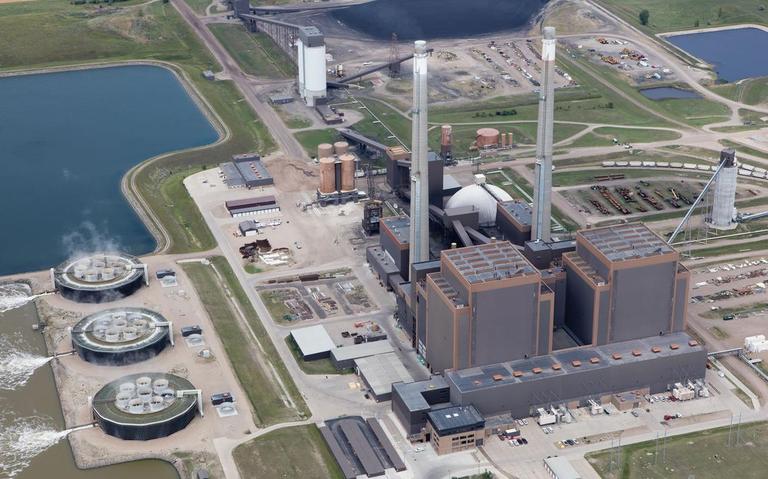Minnesota Regulators OK Sale of Power Line Tied to North Dakota's Largest Coal Plant

By Adam Willis
January 7, 2022 - The sale of North Dakota’s largest coal-fired power plant cleared a final procedural hurdle on Thursday, Jan. 6, when Minnesota utility regulators approved a permit transfer for the facility’s attached 436-mile transmission line, which carries electricity to the Twin Cities area.
The five-member Minnesota Public Utilities Commission voted unanimously to approve transfer of the valuable high voltage line from the ownership of the Twin Cities-based Great River Energy to Nexus Line, an affiliate of the Bismarck-based Rainbow Energy Marketing Corp. — part of a larger deal that appears poised to rescue North Dakota’s largest coal plant from shutting down.
The transfer of the power line was delayed by the Minnesota PUC in September after a push by environmental groups in the state to require more information from Rainbow Energy. The Minnesota PUC holds jurisdiction over portions of the transmission line transfer, but not the sale of Coal Creek Station itself.

Coal Creek Station power plant near Underwood, North Dakota.
Contributed
“Though I would like to demand that all that energy be renewable from North Dakota, I also am accepting reality today,” said PUC Commissioner John Tuma. “This is a good result, and I think letting it bake a little longer was also the right thing.”
Recent amendments to the sale agreement extend Great River Energy’s continued operations of the transmission line to 20 more years and include plans for the cooperative to develop up to 400 megawatts of new wind power, according to documents filed before the Minnesota PUC earlier this week. Great River Energy intends to have its wind farm online by 2025, and would run wind-generated power through NexusLine's transmission line to Minnesota.
Great River Energy entered into an agreement with Rainbow Energy last summer to sell the transmission line alongside the 1,100 megawatt Coal Creek Station, which had been unprofitable for years and which the utility cooperative said lost $170 million on energy sales in 2019. A deal reached between the two energy companies last summer pays just $1 for the coal plant and roughly $225 million for the transmission line, though the original confidential agreement has undergone recent amendments that could have implications for those dollar figures.
Rainbow Energy’s plans for continuing operations at Coal Creek Station hinge on an ambitious carbon capture and storage venture. A process of storing harmful greenhouse gas emissions and trapping them underground, carbon capture and storage is an expensive emerging technology that North Dakota leaders hope can make coal cleaner and more economic for the long-term.
Rainbow Energy president Stacy Tschider said in a statement Thursday that his company is "deeply committed to delivering carbon neutral electrons to Minnesota by 2030," calling the sale "a win-win for both North Dakota and Minnesota."
North Dakota leaders put in a full court press over the last year and a half to save Coal Creek Station after Great River Energy announced in the spring of 2020 that it would shut down the plant and replace its electricity generation with wind power. Coal Creek employs about 250 workers in central North Dakota, while the nearby Falkirk Mine supports several hundred more jobs.
While the Coal Creek sale has been celebrated by North Dakota leaders and many coal industry advocates in the state, it has also encountered opposition from environmental groups and some Great River Energy co-op members, who have raised skepticism about Rainbow Energy's carbon capture plans and criticized the transparency of the sale.
"While additional wind energy for GRE's member owners is welcome, this appears to be a totally new piece of information that has not yet been shared with member owners," Erik Hatlestad, energy democracy director for the Minnesota group Clean Up the River Environment, told the PUC. "It is not a comfort to member owners to consider what other major decisions are being made on their behalf behind closed doors."
Because Rainbow Energy and Great River Energy have established a new agreement, the revised contract will require another vote by Great River Energy’s member co-ops. Finalization of a deal between the two parties is expected "no earlier" than May 1, according to a statement issued by Great River Energy on Thursday.
Michael Noble, executive director for the St. Paul-based renewable energy advocacy group Fresh Energy, said that he was informed by a top Great River Energy official in July that the plant sold for $1 and the transmission line for its “book value,” about $225 million. Noble said the Great River Energy official also told him that the cooperative had hoped to get $500 million for the transmission line, its estimated market value in May of 2020.
Tschider and a Great River Energy spokesperson both declined to provide specifics about the financial terms of the agreement between Rainbow Energy and Great River Energy. Recent additions to the contract could also indicate changes to the financial terms of the deal, Noble noted.
Rainbow Energy has estimated the costs of retrofitting the two units of Coal Creek Station for carbon capture at about $1.5 billion. The process would reduce the total electricity generation from the coal plant by as much as a third, opening room on the transmission line for wind power.
Tschider said in an interview that more wind generation in addition to the 400 megawatts being deployed by Great River Energy could come online as a result of carbon capture at Coal Creek. Saving jobs at both the coal plant and the coal mine, adding renewables and pursuing carbon capture were all part of the original plan for Rainbow Energy, Tschider said, and "this gave us an opportunity to show that, yes, we are committed to all of those."
After the announcement that Great River Energy planned to shut down Coal Creek Station and replace its generation with cheaper natural gas and renewable energy, several of North Dakota's coal country counties passed moratoriums and zoning ordinances blocking new wind power production in the area.
McLean County State's Attorney Ladd Erickson, who advocated for the zoning rules and moratoriums at the time, said in an interview that he expects changes to the anti-wind ordinances to be more amenable to wind development once the Coal Creek deal is secure, though he noted that the specifics will depend on how the deal is finalized.
“It’s a different environment once the deal’s completed,” Erickson said.
Approval from the Minnesota PUC also comes a week after the Federal Energy Regulatory Commission approved an amended agreement between Great River Energy and the regional grid operator needed to help facilitate the coal plant sale.

